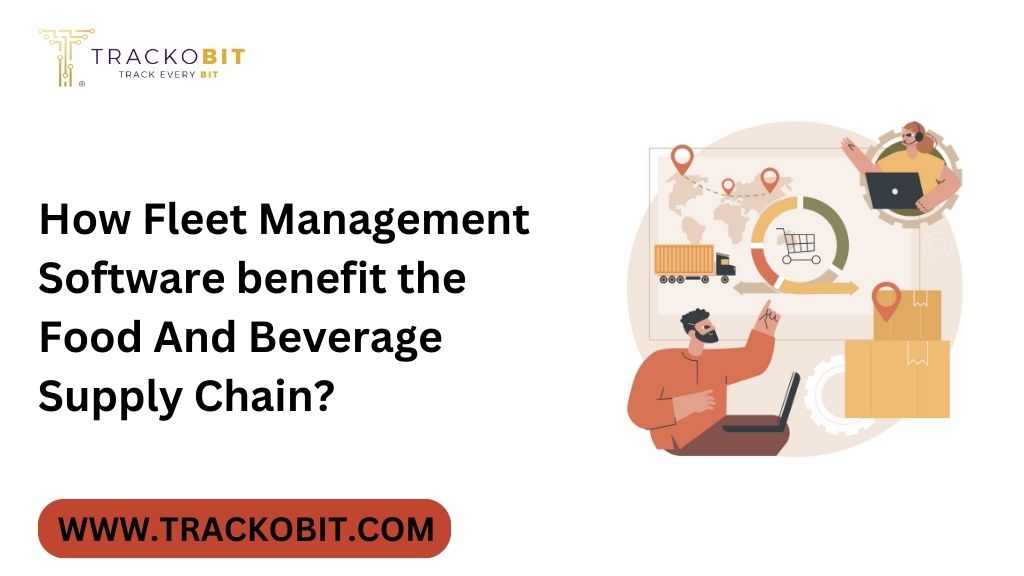Foof and beverage industry drives the entire civilisation, but what drives the F&B supply chain?
Fleet management software benefits F&B supply in optimising their logistics and warehousing operations out and out.
The Food and Beverage (F&B) industry plays a critical role in the production, distribution, marketing and supply of foods consumed by millions of people across the world. It won’t be wrong to say that the F&B industry is a key driver of the global and national food systems.
Just like every other aspect of the global market, this industry also got impacted by the worldwide pandemic. With consumers being restricted to cooking at home or ordering during the lockdown, restaurants had to reinvent their operations.
After the pandemic getting over and the world gradually coming back to normal, the F&B industry has returned to its pace. However, there are still some challenges that it has been facing for a very long time. In this article, we will know what these challenges are and how Fleet Management Software can help in mitigating them.
What Does Fleet Management Mean concerning the F&B industry?
For the Food and Beverage distributors, ‘Time is not only money but time is everything.’ Ensuring on-time and safe delivery of products helps them in building good customer relations. They need a platform that can help them sustain these relationships. Here is exactly where Fleet Management Software pops in.
Using this software, fleet managers can smoothly run their business operations without worrying about the location of their vehicles, extra fuel costs, unoptimized routes or products going stale before reaching the customers.
Before we dive deeper into these solutions, let’s know about some important transportation factors that the industry needs to look after;
Transportation Factors for F&B Industry
We live in a customer-centric landscape where businesses are constantly evolving to meet the demands of growing customers who have the flexibility to switch between vendors whenever they want. Since consumers have developed more liking towards fast deliveries, it is important for food and beverage vendors and last-mile transportation companies to;
- Fulfil the growing demand for real-time visibility.
- Ensuring on-time delivery of consignments while maintaining quality of goods
- Cultivate collaborative relations throughout the supply chain.
- Sustain themselves in a competitive supply chain market while dealing with disruptions at the same time.
But is it easier for the industry to ensure all of this while dealing with the challenges they face while transporting perishable goods (products that have a limited shelf life and are prone to decay if not preserved within a specific time frame)? The answer is yes. Before we tell you how to let’s know about the challenges first.
Challenges in the transportation of perishable goods
- Keeping tabs on the in-transit temperature
This is one of the biggest challenges faced by the F&B industry. At the same time, shipping perishable products such as fruits, dairy products, meat, eggs, etc. It is important to know the transit requirements of each product. When these requirements are not met, these products decay before reaching the distributors. Keeping regular checks on the road in the middle of the routes becomes difficult. Hence there is a need for a solution which can smoothen the process.
- Ensuring on-time deliveries
There can be several reasons for delayed deliveries. The most common of them are traffic congestion, extreme weather conditions and lack of suitable equipment. This can create a description of supply chain operations.
- Avoiding Cross Contamination between two different products
Cross Contamination of products is common during the transportation of perishable goods when harmful microbes, allergens, or other contaminants get transferred from one product to another. This can become a huge health hazard for consumers and create problems for transporters as well.
How can FMS help distributors overcome these challenges?
Here are the solutions that can help mitigate the above-mentioned problems;
- Maintain Temperature levels
With the help of Cold Chain Monitoring Software, fleet managers can ensure that the recommended temperature of each product is maintained. Also, they get instant alerts whenever the temperature falls out of recommended range. This way, they can detect temperature failures in real-time and respond promptly.
- Plan and optimize driver routes
Route planning software gives fleet managers an edge over their competitors and smoothens their operations. By entering the location in the software, they can identify the most efficient routes in terms of road conditions, time, traffic conditions and distance. This ensures that the drivers follow safer routes to deliver products.
- Video supervision
Going above and beyond to ensure the safety of consignment, ADAS and DMS allow video supervision. This gives fleet managers the accessibility to driver patterns with respect to the surrounding vehicle and in-cabin activities. Thus, helping them in identifying harmful driving patterns( harsh braking, cornering) and activities that can cause harm to the consignments.
Summing up, the Food and Beverage industry falls under the list of industries that contribute a significant amount to India’s GDP. It is further expected to grow in the coming years. Thus, the distributors need a platform that can help them overcome supply chain disruptions and build trust within the consumer base.
Fleet Management Software is the answer here. To know more about the applications of the software, schedule a demo with TrackoBit’s team today!
